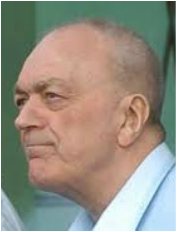The release of Harry RobertsSaturday 25 October, 2014
These two photographs were taken in London 13 days apart. The first a day of national celebration, the second a day of national mourning. Bobby Moore collecting the World Cup from the Queen is instantly recognisable. The street scene is probably less so for most readers. It is of Braybrook Street in Shepherd's Bush. The building in the background is Wormwood Scrubs prison; the Triumph with the smashed windscreen an unmarked police car. Its three unarmed occupants have just been shot dead. The two CID passengers had decided to investigate a van they had spotted in the street - given the proximity to the jail, they may have suspected that it was part of an escape plot. The tax disc was out of date and the officers were asking to see the driver's documents when the man in the passenger seat pulled out a gun and shot one of the policemen in the head. He shot the second officer as he ran back to the car and a third man in the van shot the PC waiting in the Triumph through the windscreen. 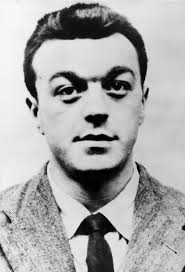
The man who started the shooting was Harry Roberts, a 30-year-old career criminal who became the subject of a huge manhunt in the autumn of 1966 after his accomplices had been caught.
A £1,000 reward was offered for his capture - the equivalent of about £17,000 today - a "living likeness" photograph (left) was widely circulated, and he was eventually found living rough in a Hertfordshire wood, having used survival techniques learnt during the Mau Mau uprising. Three weeks later he was in the dock at the Old Bailey alongside John Witney and John Duddy for a trial that lasted just six days. Roberts admitted the murder of the two officers he shot, but denied a third charge. His co-defendants denied all charges. The jury took half an hour to find them all guilty. The judge pronounced their crime to be the "most heinous for a generation" and sentenced them all to life imprisonment with a minimum of 30 years. He doubted that any Home Secretary would ever agree to their release. Duddy died in Parkhurst jail in 1981. Witney was released on licence only to be murdered by his flatmate in 1991. Now, in 2014, Roberts is about to be let loose on society. 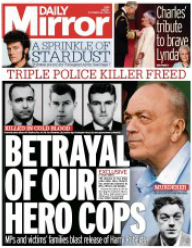
Most newspapers have reacted to the Parole Board's decision with alarm and outrage. Readers have been presented with spreads dominated by black-and-white photographs and commentaries about how lucky Roberts was simply to be alive - a moratorium on capital punishment had been introduced shortly before he went on trial, as a precursor to its abolition. News reports have been constructed from a stream of quotes from relatives of the murdered policemen, police organisations and rent-a-quote politicians. Nick Clegg has been widely mocked for daring to suggest that justice involved rather more than emotion.
Facts have been thin on the ground. That is because they are almost impossible to come by. We don't know what the Parole Board has been told or how it reached its decision. We don't know what sort of man Roberts is these days. All we know is what we can find through google or, if we're old fashioned, by looking through the cuts. So readers have been told that Roberts feels no remorse, that he lorded it around prison, that he baked apple pies decorated with bits of pastry depicting policemen being shot, that he orchestrated a terror campaign against a woman at an animal rescue centre where he worked on day release. Where did this information come from? The primary source seems to be Kate Kray, Ronnie Kray's ex-wife, who has written a score of books about criminals to whom she has had access thanks to her family connections. Roberts features in at least two - Killers and Natural Born Killers, both of which were published at the turn of the century. The Roberts chapters are based on interviews that took place 20 years ago. Then there are quotes about Roberts's attitude while in jail from the robber John McVicar, nowadays most remembered thanks to Roger Daltrey's film interpretation of his life. McVicar was released from prison in 1979. The most rational material comes from an interview with Jason Bennetto published in the Independent - but even that is now ten years old. 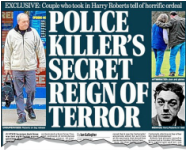
The most recent source is the Mail, which ran a series of articles in 2009 when he had another parole application pending. The paper alleged that Roberts had intimidated Joan Cartwright and her son James with nightly telephone calls over a four-year period after he was returned to a closed prison in 2001. The paper also reported that Mrs Cartwright was coerced into visiting Roberts in prison, where he made further threats to her face, and that her horses, donkeys and dogs had been attacked. Roberts had worked as a bricklayer at the Cartwrights' animal sanctuary for ten months until they complained about his behaviour. The Parole Board refused a subsequent parole application because, the paper said, "While in open conditions, you demonstrated that you are untrustworthy, utterly egocentric and highly manipulative."
Mrs Cartwright, who is 71, is now apparently terrified that the 78-year-old Roberts will harm her if he is released. This particular series of stories begs as many questions as it answers. and the absence of any official response since its publication - beyond the usual 'cannot comment on individual cases' is strange. The intro to the first piece says that Jack Straw was facing urgent questions about how Roberts was able to terrorise the Cartwrights - but five years on, no one seems to have produced any answers. 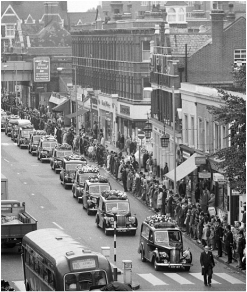
The decision to free Roberts is clearly of great public interest, especially in the light of the constant debate about reinstating the death penalty for killing police officers, so the story required prominence. Of course it was appropriate to seek the opinions of those close to the victims and interested parties. Their reaction, however, was predictable. Where were the comments from the Howard League and other such groups?
And with a dearth of solid information, how else could papers project it? Well, for a start, what is involved in preparing a 78-year-old man who is undoubtedly institutionalised for life in the outside world? Where will he live? What money will he have to live on? What benefits will he receive? Will he be given a new identity? What, if any, consideration has been given to the company he will keep, bearing in mind that a man who has been incarcerated for two-thirds of his life is likely to be acquainted almost exclusively with criminals? The Parole Board won't have come to the decision to release Harry Roberts lightly or to be perverse. Many undisclosed factors will have been considered. Speculation on the board's reasoning wouldn't help. But detailed background on how such decisions are reached and what efforts are made to try to ensure a smooth transition for the prisoner and suitable protection for society would have been far more useful than the "hang him high" hysteria. How the crime was reportedThe police fingertip search near Braybrook Street
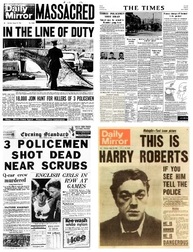
It's always fascinating to look at archive material and there is plenty relating to the Shepherds Bush murders, which is why the Roberts story has been given so much space as well as prominence this week.
Here are some photographs from the time, television footage and newspaper front pages. It is striking that children were allowed so close to the crime scene and today's journalists will find this ITN interview with children who witnessed the killings astonishing. Police and public in Braybrook Street after the killings
|
|
The victims
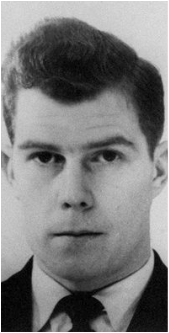
Acting Det Con David Wombwell, 25, was married with a son aged three and a year-old daughter. Roberts shot him in the eye when he approached the passenger side of the robbers' van.
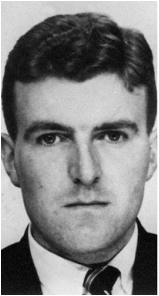
Det Sgt Christopher Head, 30, was unmarried. He was shot twice by Roberts as he ran back to the Triumph after DC Wombwell was killed. His body was trapped under the wheels of the police car, when PC Geoffrey Fox tried in vain to escape.
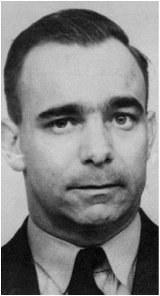
PC Geoffrey Fox, 41, was married with two daughters, aged 18 and 2, and a son of 16. He had been attached to the Shepherds Bush CID unit as a driver. John Duddy shot him three times through the windscreen of the unmarked police car.
* Surprisingly, in all the coverage, with all its outrage and concern for the victims, this week, no paper has seen fit to publish the details above. It takes quite a bit of research to find out the marital status of the victims and whether they had children. Strange that.

I don't want to be Harry Roberts the cop killer. The media talk as if the shootings were yesterday: this keeps alive this image of me as a 30-year-old cop killer. I'm not that person any more. The Home Secretary is just responding to the media hype about me. When does punishment becomes vengeance? I feel my treatment has turned into institutionalised vengeance.
- Harry Roberts quoted in an interview with the Independent in 2004 
No politician in their right mind would let Roberts out of jail if it could be helped — but thanks to the Human Rights Act (that charter for criminals), they are impotent.
Like many others, I feel great regret that Roberts did not hang. What’s more, his conduct while in prison has shown how undeserving he is. The truth is that Roberts is without humanity, remorse or decency, which makes the Parole Board’s decision all the more incomprehensible - Simon Heffer, Daily Mail, October, 2014 |
Please sign up for SubScribe updates
(no spam, no more than one every week or two)
|
|
|

